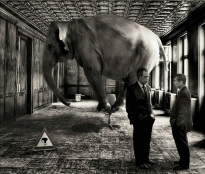Unnoticed by anyone but me, an elephant walked into the room, with a folding stool under his arm.
He wore a tutu-like frill of pink tulle around his ample waist and his head sprouted a cascade of feathers held in place by a diamante-studded chinstrap. He unfolded the stool, and very daintily lowered his wrinkled grey bottom onto it. Then the elephant draped his trunk over his chubby grey knees and just sat there.

I learned all this just last week during a chance meeting last week with an ex-circus elephant. I met him at a committee meeting of all places. The meeting had reached the stage - which many committee meetings do - when a perfect storm of unacknowledged personal agendas, power struggles, and personal animosities had completely derailed the discussion. It was then, unnoticed by anyone but me, an elephant walked into the room, with a folding stool under his arm.
The committee continued to squabble oblivious to the large grey presence in the room. The elephant was still there when the meeting stuttered to its unsatisfactory conclusion and committee members fled into the night.
I began clearing the cups and saucers and mangled agendas. There was one Griffin’s Vanilla Wine biscuit marooned on a plate and I offered it to the elephant. He swallowed it and politely Hoovered up the crumbs with his trunk. I asked him why he had been at the meeting. “It’s my job” he said.
That’s when I learned how difficult it is for an elephant to find work these days. Jumbo (not his real name) said his species’ problems had really begun about the time of the industrial revolution when reliance on brute animal strength dwindled to almost nothing. As technology grew more and more sophisticated, the elephants’ lack of opposable thumbs made it almost impossible for them to get work involving fine motor skill and precision. “Even though, said Jumbo, “we are exceedingly dexterous”. By way of demonstration he used his trunk to transfer a single peanut from the waistband of his tutu to his mouth, and sipped from a glass of water left on the table.
Ultimately, though it their sheer bulk which makes elephants unsuitable for most jobs. “Down-sizing just isn't an option for an elephant” sighed Jumbo. “What’s really hit the elephant work force hard” he said, still perched on his little stool, ”is that there’s no role for elephants in the entertainment industry any more”.
Jumbo went on to explain that the mainstay of the elephant economy has always been circus and zoo work but these jobs are almost non-existent now. “It’s ironic” he said with a rueful flap of his ears “that at the same time the animal rights lobby has reduced cruelty to animals it’s also destroyed our traditional means of making a living”. He reassured me that no one wanted a return to manacles and chains, or performances elicited by whip and prod. And he pointed out that constant touring with a circus puts a terrible stress on family life. “It’s not much fun being treated like a freak in a zoo either”, he added.
However, some of the older elephants like Jumbo remember their circus careers with great fondness. A brassy fanfare, the smell of sawdust and the pop of flash-bulbs still arouses a profound nostalgia in these old troupers for their days in the circus. The flamboyant costumes and the sound of a cheering crowd under the big top was a source of enormous satisfaction. Jumbo made the pink feathers on his headgear flutter and shimmy.
“I should really dress a bit more conservatively for this kind of job” he admitted “but I like to wear this outfit to remind the youngsters of our great lost heritage as entertainers”.
Some really old elephants have a dim memory of a time even further back. Jumbo admits that part of him wishes it was possible for him to spend his days roaming the savannah.
“I’d love to ditch the nine-to-five routine” he says “but I've only ever lived in New Zealand and I’m not sure I could fend for myself in the wild”. He shrugged his large shoulders. He’s seen enough David Attenborough to know all about ivory hunters.
According to Jumbo, it was his idea that substituting real elephants for metaphorical elephants would open up employment opportunities exclusively to elephants. The job involves drawing attention to problems that are being ignored and truths that no one wants to discuss.
“Our size is a big plus in this job” said Jumbo with some pride. It’s a lot harder to overlook a real elephant than a metaphorical one. And of course an elephant never forgets so we can keep track of lots of different interaction over time”
Jumbo now feels very optimistic about the future: there’s plenty of this kind of work around including entry-level positions for school leavers in boardrooms, committee rooms, sitting rooms and classrooms all over the country. And it’s a job with real prospects: a friend of Jumbo’s attends parliamentary debates and caucus meetings. Another works for the United Nations.
“No feathered head dresses allowed there!” joked Jumbo as he prepared to leave, neatly folding up his stool with his trunk. He thanked me for the biscuit and made for the door. “See you at the meeting next week”.
 RSS Feed
RSS Feed

